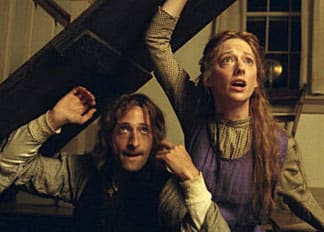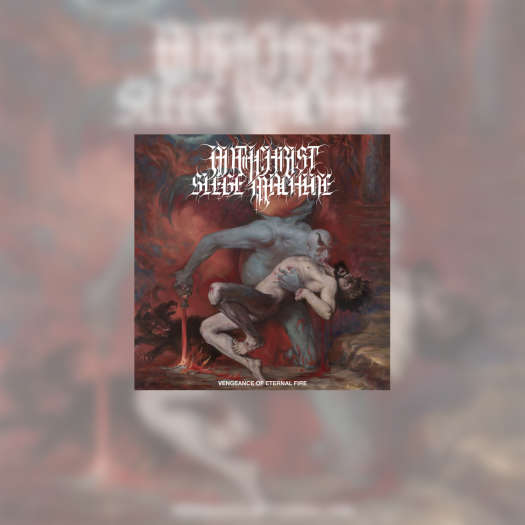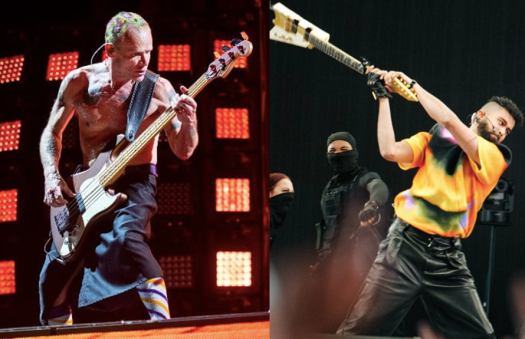Increasingly, director M. Night Shyamalan (The Sixth Sense, Unbreakable) is using his twist ending technique not as a final poignant flourish on a well-told story but as compensation for a poorly constructed narrative. This is the great disappointment of his latest film, The Village, which squanders all of its many virtues on a predictable and ludicrous twist ending.
The story takes place in an isolated 19th century village. The town elders, we're told, have negotiated an uneasy truce with "those we don't speak of": monstrous creatures that live in the surrounding woods. There's also a budding romance between a blind woman and one of the town's quietest sons (played by Bryce Dallas Howard and Joaquin Phoenix). After a slow start, Shyamalan's story lurches into gear; monsters make their first appearance and love begins to blossom.
As with Shyamalan's other films, the supernatural elements serve mostly to underscore the core domestic drama. He has a keen eye for this kind of thing and, with help from the key players and a strong visual motif, his story establishes a wonderful atmosphere of impending doom.
By the beginning of the second hour, the story seems ready to shed its domestic rhythms for some form of blistering and, hopefully, satisfying conclusion. Indeed, there are glimpses of that film peaking through the late autumn leaves that carpet The Village's 40-acre set. But as the story drifts toward its conclusion, it becomes clear that something at the Shyamalan story factory has gone terribly wrong.
The first sign of trouble is the overuse of voiceover narration, which works way too hard to tie up the story's many loose ends. Pretty soon, the whole cast is running around frantically trying to explain the details of the twist ending. But the worst and final blow comes in the film's dwindling moments when the director makes a cameo appearance to explain, literally, a few more loose ends.
Shyamalan's appearance in his own films is a move that's meant to reference Alfred Hitchcock and, used tastefully, it would be a loving and appropriate tribute. But while Hitchcock's cameos add to the enigma of his films and his public persona, increasingly Shyamalan's cameos reek of vanity and of confidence lost in his own abilities to get the story right. (Buena Vista)
The story takes place in an isolated 19th century village. The town elders, we're told, have negotiated an uneasy truce with "those we don't speak of": monstrous creatures that live in the surrounding woods. There's also a budding romance between a blind woman and one of the town's quietest sons (played by Bryce Dallas Howard and Joaquin Phoenix). After a slow start, Shyamalan's story lurches into gear; monsters make their first appearance and love begins to blossom.
As with Shyamalan's other films, the supernatural elements serve mostly to underscore the core domestic drama. He has a keen eye for this kind of thing and, with help from the key players and a strong visual motif, his story establishes a wonderful atmosphere of impending doom.
By the beginning of the second hour, the story seems ready to shed its domestic rhythms for some form of blistering and, hopefully, satisfying conclusion. Indeed, there are glimpses of that film peaking through the late autumn leaves that carpet The Village's 40-acre set. But as the story drifts toward its conclusion, it becomes clear that something at the Shyamalan story factory has gone terribly wrong.
The first sign of trouble is the overuse of voiceover narration, which works way too hard to tie up the story's many loose ends. Pretty soon, the whole cast is running around frantically trying to explain the details of the twist ending. But the worst and final blow comes in the film's dwindling moments when the director makes a cameo appearance to explain, literally, a few more loose ends.
Shyamalan's appearance in his own films is a move that's meant to reference Alfred Hitchcock and, used tastefully, it would be a loving and appropriate tribute. But while Hitchcock's cameos add to the enigma of his films and his public persona, increasingly Shyamalan's cameos reek of vanity and of confidence lost in his own abilities to get the story right. (Buena Vista)




